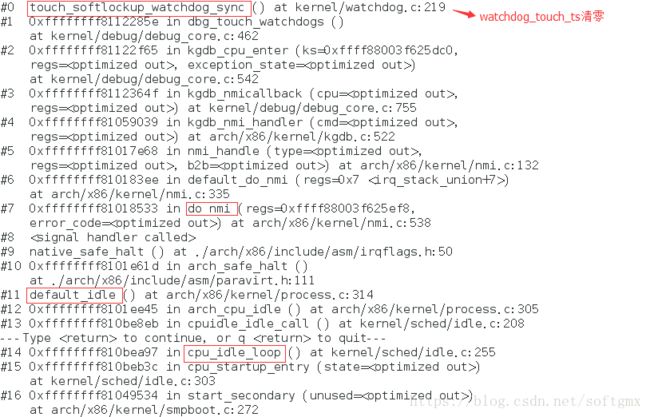linux内核研究--watchdog实现分析
/kernel/watchdog.c
tatic DEFINE_PER_CPU(unsigned long, watchdog_touch_ts); //记录是时间戳,主要在watchdog线程中更新
static DEFINE_PER_CPU(struct task_struct *, softlockup_watchdog);
static DEFINE_PER_CPU(struct hrtimer, watchdog_hrtimer);
static DEFINE_PER_CPU(bool, softlockup_touch_sync);
static DEFINE_PER_CPU(bool, soft_watchdog_warn);
static DEFINE_PER_CPU(unsigned long, hrtimer_interrupts); //在hrtimer处理函数中更新
static DEFINE_PER_CPU(unsigned long, soft_lockup_hrtimer_cnt);
static DEFINE_PER_CPU(struct task_struct *, softlockup_task_ptr_saved);
#ifdef CONFIG_HARDLOCKUP_DETECTOR
static DEFINE_PER_CPU(bool, hard_watchdog_warn);
static DEFINE_PER_CPU(bool, watchdog_nmi_touch);
static DEFINE_PER_CPU(unsigned long, hrtimer_interrupts_saved); //在is_hardlockup中更新,更新为hrtimer_interrupts
static DEFINE_PER_CPU(struct perf_event *, watchdog_ev);
/* Commands for resetting the watchdog */
static void __touch_watchdog(void)
{
__this_cpu_write(watchdog_touch_ts, get_timestamp());
}
static void watchdog(unsigned int cpu)
{
__this_cpu_write(soft_lockup_hrtimer_cnt,
__this_cpu_read(hrtimer_interrupts));
__touch_watchdog();
}
static struct smp_hotplug_thread watchdog_threads = {
.store = &softlockup_watchdog,
.thread_should_run = watchdog_should_run,
.thread_fn = watchdog, //线程函数就是更新当前CPU的watchdog_touch_ts变量的值
.thread_comm = "watchdog/%u",
.setup = watchdog_enable,
.cleanup = watchdog_cleanup,
.park = watchdog_disable,
.unpark = watchdog_enable,
};
//启动nmi中断来检查hardlockup
//启动了一个高精度定时器,定时器的处理函数watchdog_timer_fn 负责检查是否发生了softlockup
static void watchdog_enable(unsigned int cpu)
{
struct hrtimer *hrtimer = raw_cpu_ptr(&watchdog_hrtimer);
/* kick off the timer for the hardlockup detector */
hrtimer_init(hrtimer, CLOCK_MONOTONIC, HRTIMER_MODE_REL);
hrtimer->function = watchdog_timer_fn;
/* Enable the perf event */
watchdog_nmi_enable(cpu);
/* done here because hrtimer_start can only pin to smp_processor_id() */
hrtimer_start(hrtimer, ns_to_ktime(sample_period),
HRTIMER_MODE_REL_PINNED);
/* initialize timestamp */
watchdog_set_prio(SCHED_FIFO, MAX_RT_PRIO - 1);
__touch_watchdog();
}
/* watchdog kicker functions */
static enum hrtimer_restart watchdog_timer_fn(struct hrtimer *hrtimer)
{
unsigned long touch_ts = __this_cpu_read(watchdog_touch_ts);
struct pt_regs *regs = get_irq_regs();
int duration;
int softlockup_all_cpu_backtrace = sysctl_softlockup_all_cpu_backtrace;
/* kick the hardlockup detector */
watchdog_interrupt_count();
/* kick the softlockup detector */
wake_up_process(__this_cpu_read(softlockup_watchdog));
/* .. and repeat */
hrtimer_forward_now(hrtimer, ns_to_ktime(sample_period));
if (touch_ts == 0) {
if (unlikely(__this_cpu_read(softlockup_touch_sync))) {
/*
* If the time stamp was touched atomically
* make sure the scheduler tick is up to date.
*/
__this_cpu_write(softlockup_touch_sync, false);
sched_clock_tick();
}
/* Clear the guest paused flag on watchdog reset */
kvm_check_and_clear_guest_paused();
__touch_watchdog();
return HRTIMER_RESTART;
}
/* check for a softlockup
* This is done by making sure a high priority task is
* being scheduled. The task touches the watchdog to
* indicate it is getting cpu time. If it hasn't then
* this is a good indication some task is hogging the cpu
*/
duration = is_softlockup(touch_ts);
if (unlikely(duration)) {
/*
* If a virtual machine is stopped by the host it can look to
* the watchdog like a soft lockup, check to see if the host
* stopped the vm before we issue the warning
*/
if (kvm_check_and_clear_guest_paused())
return HRTIMER_RESTART;
/* only warn once */
if (__this_cpu_read(soft_watchdog_warn) == true) {
/*
* When multiple processes are causing softlockups the
* softlockup detector only warns on the first one
* because the code relies on a full quiet cycle to
* re-arm. The second process prevents the quiet cycle
* and never gets reported. Use task pointers to detect
* this.
*/
if (__this_cpu_read(softlockup_task_ptr_saved) !=
current) {
__this_cpu_write(soft_watchdog_warn, false);
__touch_watchdog();
}
return HRTIMER_RESTART;
}
if (softlockup_all_cpu_backtrace) {
/* Prevent multiple soft-lockup reports if one cpu is already
* engaged in dumping cpu back traces
*/
if (test_and_set_bit(0, &soft_lockup_nmi_warn)) {
/* Someone else will report us. Let's give up */
__this_cpu_write(soft_watchdog_warn, true);
return HRTIMER_RESTART;
}
}
pr_emerg("BUG: soft lockup - CPU#%d stuck for %us! [%s:%d]\n",
smp_processor_id(), duration,
current->comm, task_pid_nr(current));
__this_cpu_write(softlockup_task_ptr_saved, current);
print_modules();
print_irqtrace_events(current);
if (regs)
show_regs(regs);
else
dump_stack();
if (softlockup_all_cpu_backtrace) {
/* Avoid generating two back traces for current
* given that one is already made above
*/
trigger_allbutself_cpu_backtrace();
clear_bit(0, &soft_lockup_nmi_warn);
/* Barrier to sync with other cpus */
smp_mb__after_atomic();
}
add_taint(TAINT_SOFTLOCKUP, LOCKDEP_STILL_OK);
if (softlockup_panic)
panic("softlockup: hung tasks");
__this_cpu_write(soft_watchdog_warn, true);
} else
__this_cpu_write(soft_watchdog_warn, false);
return HRTIMER_RESTART;
}
//启动nmi中断来检查hardlockup
static int watchdog_nmi_enable(unsigned int cpu)
{
struct perf_event_attr *wd_attr;
struct perf_event *event = per_cpu(watchdog_ev, cpu);
/*
* Some kernels need to default hard lockup detection to
* 'disabled', for example a guest on a hypervisor.
*/
if (!watchdog_hardlockup_detector_is_enabled()) {
event = ERR_PTR(-ENOENT);
goto handle_err;
}
/* is it already setup and enabled? */
if (event && event->state > PERF_EVENT_STATE_OFF)
goto out;
/* it is setup but not enabled */
if (event != NULL)
goto out_enable;
wd_attr = &wd_hw_attr;
wd_attr->sample_period = hw_nmi_get_sample_period(watchdog_thresh);
/* Try to register using hardware perf events */
event = perf_event_create_kernel_counter(wd_attr, cpu, NULL, watchdog_overflow_callback, NULL);
handle_err:
/* save cpu0 error for future comparision */
if (cpu == 0 && IS_ERR(event))
cpu0_err = PTR_ERR(event);
if (!IS_ERR(event)) {
/* only print for cpu0 or different than cpu0 */
if (cpu == 0 || cpu0_err)
pr_info("enabled on all CPUs, permanently consumes one hw-PMU counter.\n");
goto out_save;
}
/* skip displaying the same error again */
if (cpu > 0 && (PTR_ERR(event) == cpu0_err))
return PTR_ERR(event);
/* vary the KERN level based on the returned errno */
if (PTR_ERR(event) == -EOPNOTSUPP)
pr_info("disabled (cpu%i): not supported (no LAPIC?)\n", cpu);
else if (PTR_ERR(event) == -ENOENT)
pr_warn("disabled (cpu%i): hardware events not enabled\n",
cpu);
else
pr_err("disabled (cpu%i): unable to create perf event: %ld\n",
cpu, PTR_ERR(event));
return PTR_ERR(event);
/* success path */
out_save:
per_cpu(watchdog_ev, cpu) = event;
out_enable:
perf_event_enable(per_cpu(watchdog_ev, cpu));
out:
return 0;
}
/* Callback function for perf event subsystem */
static void watchdog_overflow_callback(struct perf_event *event,
struct perf_sample_data *data,
struct pt_regs *regs)
{
/* Ensure the watchdog never gets throttled */
event->hw.interrupts = 0;
if (__this_cpu_read(watchdog_nmi_touch) == true) {
__this_cpu_write(watchdog_nmi_touch, false);
return;
}
/* check for a hardlockup
* This is done by making sure our timer interrupt
* is incrementing. The timer interrupt should have
* fired multiple times before we overflow'd. If it hasn't
* then this is a good indication the cpu is stuck
*/
if (is_hardlockup()) {
int this_cpu = smp_processor_id();
/* only print hardlockups once */
if (__this_cpu_read(hard_watchdog_warn) == true)
return;
if (hardlockup_panic)
panic("Watchdog detected hard LOCKUP on cpu %d",
this_cpu);
else
WARN(1, "Watchdog detected hard LOCKUP on cpu %d",
this_cpu);
__this_cpu_write(hard_watchdog_warn, true);
return;
}
__this_cpu_write(hard_watchdog_warn, false);
return;
}
#ifdef CONFIG_HARDLOCKUP_DETECTOR
//hardlockup检查逻辑
static int is_hardlockup(void)
{
unsigned long hrint = __this_cpu_read(hrtimer_interrupts);
if (__this_cpu_read(hrtimer_interrupts_saved) == hrint)
return 1;
__this_cpu_write(hrtimer_interrupts_saved, hrint);
return 0;
}
#endif
//softlockup检查逻辑
static int is_softlockup(unsigned long touch_ts)
{
unsigned long now = get_timestamp();
/* Warn about unreasonable delays: */
if (time_after(now, touch_ts + get_softlockup_thresh()))
return now - touch_ts;
return 0;
}

